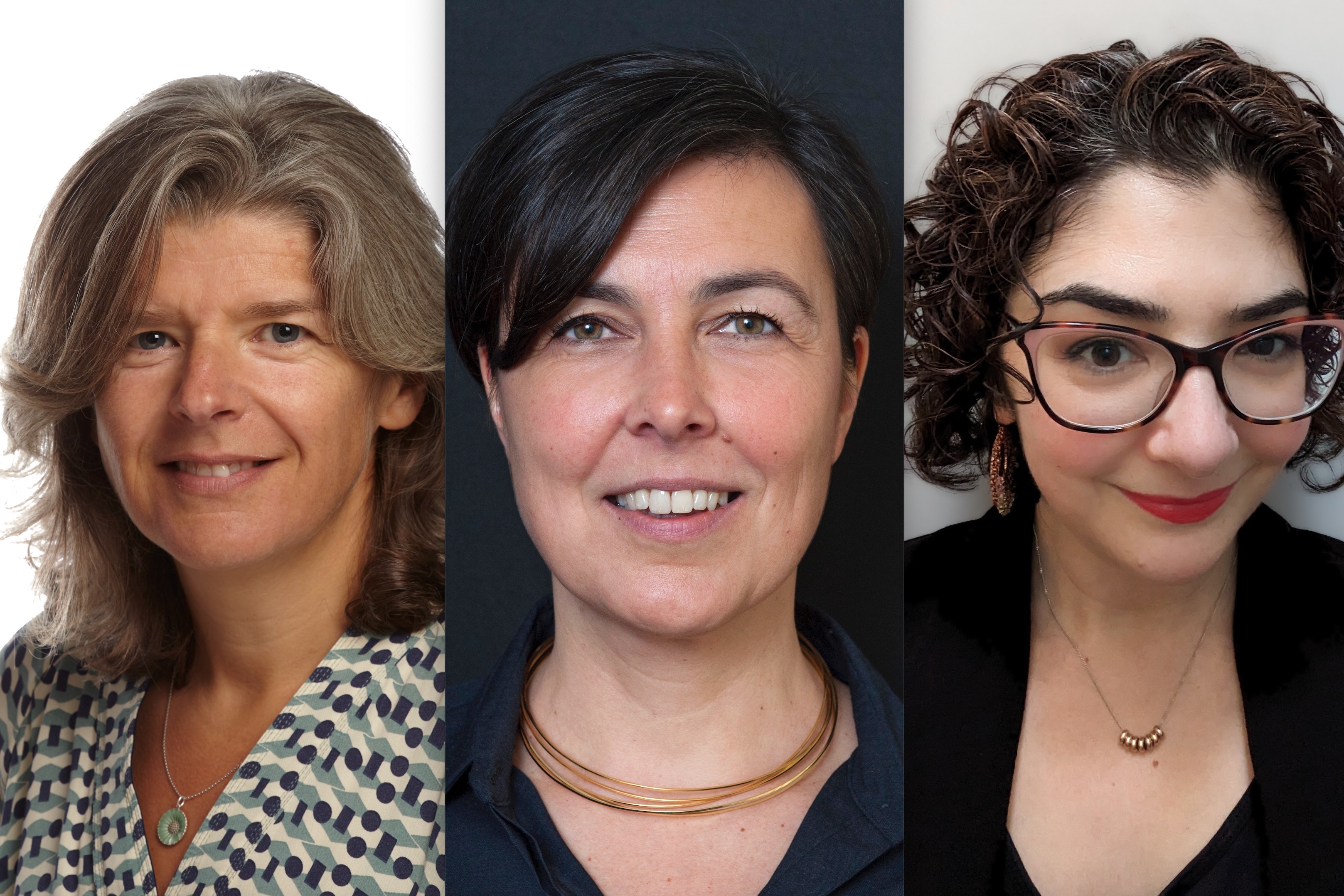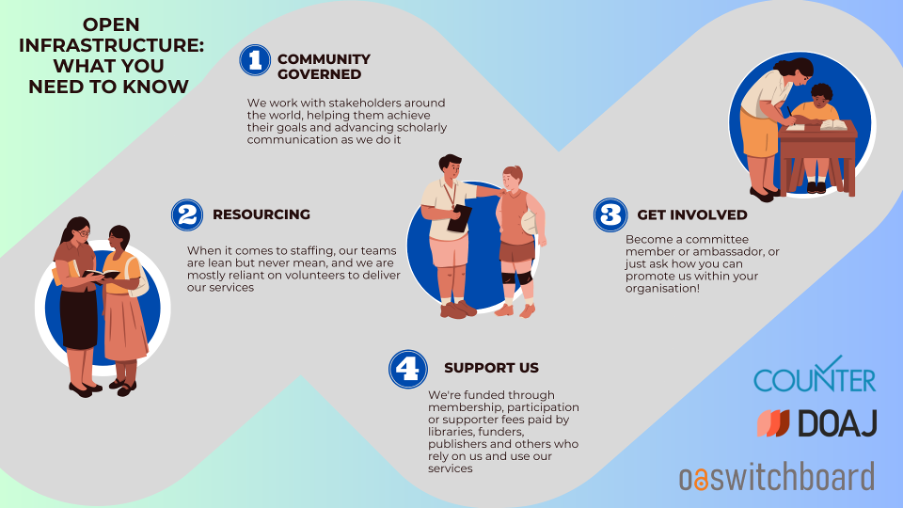Who’s afraid of open infrastructures?

Joanna Ball, Yvonne Campfens, and Tasha Mellins-Cohen
Joanna Ball, Yvonne Campfens and Tasha Mellins-Cohen underline the importance of non-profit infrastructure and standards bodies
Over time, the scholarly communications community has organised itself to develop a foundational layer of collaborative, cross-sector, community-led, not-for-profit infrastructure and standards bodies.
They are essential for many of the services that we rely on in finding, tracking, connecting and monitoring where content can be found and how it is published and used. We head up three of the smallest of these bodies, and here we outline the rationale behind their creation and the value they bring to the community, as well as explaining how the community can help these organisations thrive.
Our origin stories
In the early years of digital content every publisher measured usage differently, and librarians didn’t know what measures to trust. Recognising this challenge, Peter Shepherd gathered a group of librarians and publishers to create an industry standard for measuring usage, drawing on his history of digitisation projects at Wiley and Elsevier. The result became COUNTER (https://www.projectcounter.org/), launched in 2003. Just as Peter was wrestling with the idea of community-defined metrics, Lars Bjørnshauge, the Head Librarian at Lund University, took on another challenge. Seeing the growing volume of open access scholarly content, he set out to create a directory to help researchers and librarians across the world find, use and trust peer-reviewed OA journals, regardless of discipline, geography or language. The Directory of Open Access Journals (DOAJ, https://doaj.org/) was born.
Twenty years later, both COUNTER and DOAJ are essential components of the knowledge ecosystem – but new challenges arise and new organisations are needed to help meet them. In 2018 the idea for the OA Switchboard (https://www.oaswitchboard.org/) was conceived to allow publishers, libraries and research funders to easily share information about OA publications throughout the publication journey, synchronising data from a multitude of systems and processes that would otherwise have to be manually connected within each separate organisation.
What do these organisations have in common? We are all owned and led by our community, and we’re not for sale or for profit. We are foundational open infrastructure and standards bodies, operating behind the scenes with low budgets and limited staffing – none of us have salespeople, marketing teams, exhibition budgets or in-house technology support. We collaborate with one another and with bigger bodies like Crossref, ORCID and NISO to create the foundations on which much scholarly infrastructure relies.
And foundations is absolutely the right word: scholarly communications is an exciting and innovative space with new commercial and non-commercial services springing up almost daily. We deliver value through open infrastructure, data and standards, and naturally services and tools have been built by commercial and not-for-profit groups that capitalise on our open, interoperable data and services – many of which you are likely to recognise and may use on a regular basis.
Building on strong foundations
The well-established and widely used Journal Usage Statistics Portal (JUSP) from Jisc is inherently designed to collect COUNTER reports, using the SUSHI protocol we define in the Code of Practice to automate reporting. Jisc built JUSP as a way to reduce the enormous administrative burden of every library needing to individually download their usage reports from every publisher. Today, JUSP harvests usage metrics from more than 120 publishers on behalf of hundreds of libraries around the world, saving a huge amount of time and duplicated effort.
Turning our attention from usage of content to the content itself, library discovery systems such as EBSCO Discovery Service or Ex Libris’ Primo have relied on DOAJ's unique dataset to provide access to high-quality, peer reviewed OA journals in their databases. We list the largest number of quality open access journals of any index, with a far wider geographic coverage than either Web of Science or Scopus, so incorporating our metadata into library discovery services gives researchers access to a more diverse range of content with fewer access barriers than ever before, delivering on the original promise of OA.
On the topic of OA, research funders have for years wanted better insight into the published research outputs arising from their grant funding. The OA Switchboard's standardised data interchange protocol has meant that funders like the Howard Hughes Medical Institute and FWF (the Austrian Science Fund) can for the first time quickly and easily be alerted when an article associated with one of their grants is published - as well as being able to access reports by publisher, by author institution and by grant. Some have chosen to do this directly in the Switchboard, but those funders who have elected to use ChronosHub's commercial services also benefit from our API: “The communications standards, the cleanliness of the data and the API that the OA Switchboard provides all help contribute to a better functioning ecosystem”, says Tom Jakobs from FNR (the Luxembourg National Research Fund).

Sustainability and support
We’re delighted that our services are so central to the knowledge community! The purpose of open infrastructure and standards is to provide a foundation on which other services may be built, where competition and commercial solutions can drive innovations and bring costs down, and the proliferation of services built on our foundations suggests we’re meeting a real need. Our next challenge is to ensure that we’re still around in the future, so the foundations are not pulled out from underneath the products and tools so valued by so many of our members and participants. To do that we need to ensure we are sustainable. As the Principles of Open Scholarly Infrastructure (POSI, https://openscholarlyinfrastructure.org/) outline, that means:
- We must not be reliant on grant funding for running costs;
- All revenue generating activities need to be aligned with our organisational missions, based on services and not on our open data and standards; and
- We need to generate a small surplus that will allow us to innovate and meet changing community needs.
Today, all of us meet that definition of sustainability, often through membership, participation or supporter fees paid by libraries, funders, publishers and third parties such as aggregators and technology providers who rely on us and use our services. As budgets come under increasing pressure, we’re calling for budget holders to consider the value we bring to the knowledge community and to continue supporting us as paying members of our communities or participants benefiting from our services.
For all that POSI defines sustainability in financial terms, in our view to be truly sustainable we also need maximum engagement with our communities. This can be as simple as signing up for our newsletters, turning up for a webinar, or coming to say hello at a conference. Of course we recommend embedding the tools and services we provide into your activities, whether that’s integrating DOAJ metadata into library catalogues to help users access a more diverse range of content, using the OA Switchboard to track your OA publications, or highlighting the return on library investments using COUNTER usage metrics. If you want to really boost our impact, though, we’d love for you to consider becoming a more active volunteer. Our advisory boards directly influence our long-term strategies as well as our day-to-day operations, and having the widest possible range of voices in those groups is essential to us being able to continue meeting the needs of the knowledge community for well-designed, stable infrastructure and standards. So drop us a line and get involved – we’d love to have you!
Get involved by contacting: COUNTER: tasha.mellins-cohen@counterusage.org; DOAJ: joanna@doaj.org; or OA Switchboard: yvonne.campfens@oaswitchboard.org






